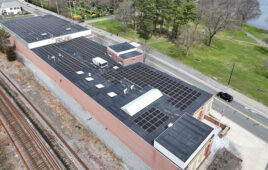Rocky Mountain Institute and 35 solar energy industry leaders committed to develop an ultra-low-cost solar product able to operate in a variety of environments at fully installed costs as low as $0.50/Wp.
Participants at the Rocky Mountain Institute-hosted event, representing at least 15 gigawatts of solar capacity—equivalent to the capacity of 25 average-sized coal plants—identified an opportunity to reduce costs by $0.20/Wp in 2018 alone. Reducing costs at this scale would mitigate the effect of newly applied trade restrictions on solar components, keeping the solar energy industry on a maintained cost-reduction pathway.
The four-day workshop saw over 35 leading companies applying best practices in system design, supply chain, business model, finance and market structures to the debate. Members identified a pathway to create a modular, pre-engineered and pre-assembled solar product of standardized design targeting a fully installed cost of ¢50/W and lower costs by as much as $0.20/Wp (dollars in watt peak) in 2018 alone, corresponding to about an 8% reduction in the average national price of residential electricity.
In the last five years, the solar industry has realized year-over-year growth rates of 21%, attracted more than $100 billion in investment, and now employs more than 260,000 people in the U.S. as one of its fastest-growing energy sectors. Yet for solar to reach its full potential as a foundational, carbon-free energy source in the U.S. and around the world, it must compete without subsidy in wholesale markets.
“In addition to the benefit of a step-change in cost reduction, a more standard offering would be particularly effective in opening up new market segments of smaller installations, where the cost of project-by-project customization has diminishing returns,” said Thomas Koch Blank, principal, Rocky Mountain Institute
Community-scale solar (CSS), also referred to as distribution-scale solar—installations of 1–10 MWp, cited close to load and connected to the distribution grid rather than the transmission grid—is emerging as a “sweet spot” for the build-out of solar energy development. In addition to low-cost electricity, CSS provides distributed benefits such as avoided transmission costs, reduced peak energy charges, potentially avoided capital expenditure for grid upgrades, ancillary services, and increased resilience.
“By taking a whole-systems approach that leverages standardization to enable preassembly and pre-engineering, the roadmap to delivering a low-cost, easy-to-understand product offering is clear. Furthermore, regional preassembly of solar equipment and components, which get trucked to local sites for efficient installation, creates new jobs and community investment,” said Jules Kortenhorst, CEO, Rocky Mountain Institute
Even as policy change results in immediate-term headwinds, all signs point to clean, abundant solar power increasingly becoming the energy source of choice for individuals, communities, and businesses across the globe. It is in all Americans’ interest to invest in the successful future of this domestic high-growth industry with significant potential to raise overall productivity, drive economic growth and create jobs. We are individually and collectively committed to accelerating the delivery of solar energy’s many benefits to the American people.
Signed,
Jules Kortenhorst
CEO, Rocky Mountain Institute
Jeff Tannenbaum
Founder, sPower LLC & PACENation
Danny Kennedy
MD, California Clean Energy Fund
Co-founder Sungevity, Powerhouse
Jigar Shah
Co-founder and President, Generate Capital
Founder and former CEO, SunEdison LLC
Workshop participants
- Abraaj Group
- BayWa R.E.
- BHP Billiton
- Certain Solar
- City of San Diego
- Cypress Creek
- Distributed Resource Ventures
- FCX
- Fir Tree Partners
- HDR
- Georgia Tech
- GSSG
- Guzman Energy
- Kevala Analytics
- LightSource
- Metka EGN
- National Grid
- Nokomis Partners
- OmCo
- Omnidian
- Quest Renewables
- Sierra Club, Ready for 100
- SolarEdge
- Solar Energy Industries Association
- Sonepar
- Sulas Industries
- VisionRidge
News item from Rocky Mountain Institute





Would be ideal if companies / manufacturers would create / develop a standardised installation in a modular format. That would also enable & allow DIY people to do more of their own as well which would further accelerate Solar Deployment. Yes of course there is the entire certification to attach to grid and all that BUT that should not stop people from being able to install their systems in a plug & play fashion as it were. I’m off grid and installed everything myself and even though I have decades of experience with technology, computer systems and electrical wiring, it still wasn’t easy or straight forward.
I also understand that many companies are in the “early Personal Computer Mode” trying to keep territory and speaking in bafflegab alphabet soup (you have to remember the late 1980’s PC shops) as well as securing installer positions etc… but the real money isn’t the little Homeowner who wants a system for themselves, it’s the big jobs, the commercial jobs where the money is.